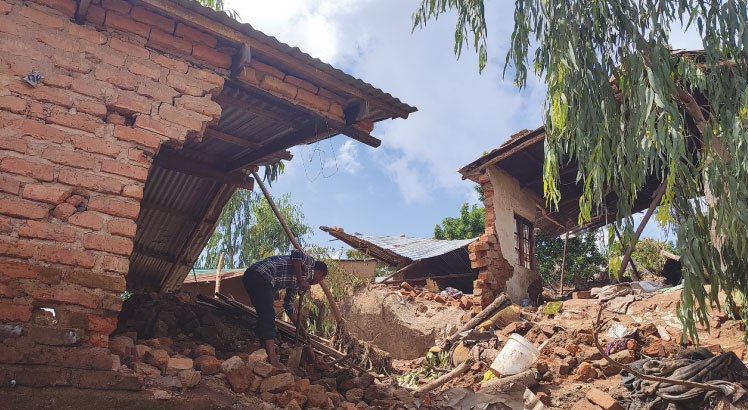Saving Dzalanyama Range from deforestation
At first, there was harmony between Dzalanyama Forest Range in Lilongwe and villagers living adjacent to it. One such village is Beni in Traditional Authority Masula’s area.
The forest range was thick and dense with trees of different types. These trees would provide the locals with convenient means of their daily survival.
“We could hardly walk distances to get mushrooms and gather firewood,” says Lizineti Josiah, a local woman from the village.
Men, too, had it easy to live up to their roles.
“The forest was an answer to our challenges. You can talk of building houses and curing our tobacco. When vegetables got us bored, we could easily slip into the forest and come back with an animal,” says Village Headman (VH) Beni.
Income generation was not so hard either.
“Whenever short of cash,” says Beni, “you could go into the forest, cut a tree, make charcoal or collect a bunch of the branches as firewood to the market. It was fast money.”
Today, things have completely changed. The harmony that existed between Dzalanyama Forest Range and Beni Village is on the rocks.
“Changing economic fortunes and income generating activities have, over the years, left people with Dzalanyama as the only option. We are all exploiting the forest to our economic advantage,” says the village head.
He adds: “The scale of people going into the forest is bewildering. Everybody is in the forest gathering firewood to sell or to make charcoal for the market.”
A visit to Dzalanyama Range, last week showed a number of cyclists carrying heaps of firewood while some carried huge sacks of charcoal on their way to the market. Their common market is Mitunduâ€â€an almost 20 kilometre-journey from the range.
“We do this on a daily basis. If we don’t, how will we survive?” said Pilato Elefanti, a local from Beni village, holding his bicycle that had carried bunches of firewood stacked on the carrier as he went to the market.
Pointing to one of the bunches, he continued: “A bunch like this fetches K1 400 with the intermedieries, who sell at a higher price in the city. I have been doing this for about 15 years now. This is how I meet my family needs.”
The tragedy of it all, according to Lilongwe district forestry officer (DFO) Jipate Munyenyembe, is that on a daily basis there are almost 300 cyclists carrying loads of firewood to the market, and hundreds more carrying sacks of charcoal.
“The problem,” says Munyenyembe, “is that the scale of trees being cut from Dzalanyama completely exceeds those being planted. This is a serious ecological disaster.”
The state of the once thick and dense Dzalanyama Range, today, is that of desolation. It is utmost bare, with just shrubs swaying to the winds. Trees are far off. Those that used to be near the villages have all been cut.
Munyenyembe says wanton cutting down of trees in the forests by villagers living on the edge of range is threatening mainly water supply in the city and surrounding areas.
“The cutting down of trees is increasing sedimentation in rivers around Lilongwe which is causing a drop in water levels in these rivers,” says Munyenyembe.
He adds: “This points to serious problems in the near future. Too much sediment means the Lilongwe Water Board [LWB] will need a lot of chemicals to treat the water for supply. And that means the cost of water would increase.”
Locals, too, know the consequences of their actions.
VH Beni says the area has been experiencing unreliable rainfall over a period of over four years when the problem’s gravity has clearly come to the fore.
“In those days, our crops would mature around this period [February], but that is not the case now,” says Beni.
He did not stop there.
“As you can see, the maize crop in the fields is still tender and far from reaching the milking stage. And some farmers are still planting their crop. All this is because the rains did not start at the right time and they are not reliable,” he advances.
One Ghanaian local, Aregash Ayele, observed that ‘a woman’s life is hard, and climate change is making it harder.’
The observation speaks volumes of what women are going through in Beni Village.
“We are not harvesting as much as we used to because rains are no longer falling adequately. The problem is also causing a drop of water levels in rivers,” says Josiah, adding that she travels long distances to fetch water.
Women here are not just walking distances to fetch water. Just as men who, even when they dare to hunt they come back empty-handed, women, too, can’t find the mushrooms.
“In those days, we would collect a lot mushrooms for sale. We did not solely depend on our husbands. Today, the situation has changed,” she says.
Government, through the Lilongwe District Forestry Office (DFO), hasn’t been sitting idle watching the depletion of the range.
“We have guards,” says Munyenyembe, “their job is to patrol and arrest culprits who get into the forest without permission. However, the job at their hand is just too wide. The number of people getting into the forest is just too much.”
To beef up the guards, DFO does sometimes engage the Malawi Defence Force to hold patrols.
But beyond this, according to Munyenyembe, they are also engaging communities and stakeholders in the tree planting exercise.
“By the end of this season, we intend to plant almost 11 million trees in the forest. Interestingly, up to 2 000 trees supplied by the Irrigation for Rural Livelihood and Development [IRLAD] have already been planted,” he says.
He continues that another 118 500 trees supplied under the Local Development Fund (LDF), 102 000 under the Rural Infrastructure Development Programme (RIDP) and 250 000 under the Presidential Initiative have also been planted.
Perhaps, in future, the lost harmony between Beni and Dzalanyama will be restored.





